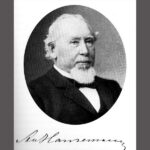Quote:
The free area still available in the South Seas for the establishment of colonies is (…) comprehensive (…). Germany’s legitimacy lies in the numerous German settlements and trading posts spread over many groups of islands, in the considerable share of its merchant flag in the South Seas, in the high reputation which its sea power enjoys in the Pacific Ocean, and in the ports that German sea power has secured.
Source:
*Rheinisches JournalistInnenbüro & recherche international (2012): Die Dritte Welt im Zweiten Weltkrieg. Unterrichtsmaterialien zu einem vergessenen Kapitel der Geschichte, p. 156, in German
Author Bio:
Adolph von Hansemann (1826-1903) was a colonial trader and banker. He turned his father's bank into the largest private bank in the German Empire.
Context:
 Chancellor Bismarck asked the entrepreneur Hansemann to come up with ways of enforcing German colonial goals in the Pacific. Hansemann's suggestions as to which areas should be colonised were almost exactly implemented by German colonial policy in 1884, 1845 and 1899. In Hansemann's language, areas not occupied by white people and not "developed" by international trade structures were referred to as "free". Hansemann saw the German justification for founding colonies in the fact that German merchants have already spread there anyway. Successful capitalist trade therefore justifies the colonisation of non-whites.
Chancellor Bismarck asked the entrepreneur Hansemann to come up with ways of enforcing German colonial goals in the Pacific. Hansemann's suggestions as to which areas should be colonised were almost exactly implemented by German colonial policy in 1884, 1845 and 1899. In Hansemann's language, areas not occupied by white people and not "developed" by international trade structures were referred to as "free". Hansemann saw the German justification for founding colonies in the fact that German merchants have already spread there anyway. Successful capitalist trade therefore justifies the colonisation of non-whites.Further Reading:
*Eduardo Galeano (1997): Open Veins of Latin America: Five Centuries of the Pillage of a Continent. New York. Monthly Review Press.
Year:
1880